Following a long-held Senate intelligence committee report [pdf] declassified today the world and human rights activist learned during George W. Bush administration the CIA “provided inaccurate information to the White House, Congress, the Justice Department, the CIA inspector general, the media and the American public” about the “brutal” interrogation techniques it used on terrorism suspects and detainees.
Following the killing of Osama bin Laden by US special operations forces, the pro-torture CIA crowd at the time pointed to the raid as evidence that human rights-abusing questioning could prove useful in producing essential intelligence. And this debate was revived in 2013 when the film Zero Dark Thirty implied the same point.
Weeks ago human rights and US government transparency activists intensified calls for the release of the Senate’s CIA report after Secretary of State John Kerry reportedly made a last-ditch call for the Senate Intelligence Committee to delay its public disclosure. According to a report in Bloomberg News, Kerry phoned Sen. Dianne Feinstein, D-Calif., chairwoman of the Intelligence Committee Friday to ask her to delay the release.
Kerry said he supported the report’s release, just not next week.
The report contains hard evidence that despite repeated violent interrogation of terror suspects – instances of which Dianne Feinstein, the committee chair, admits techniques were “torture” – the CIA failed to gather any information that foiled subsequent threats to US national security, the report found.
Across the Atlantic, many believe the UK government has also failed to oversee an adequate investigation into Britain’s involvement in these practices. Officials report being “concerned” about the contents of the Senate’s report and have yet to come forward with comment.
In 2013, the British government shelved a state inquiry into Britain’s role in CIA rendition, only to be criticized by the probe’s presiding judge, who suggested the investigation lacked sufficient depth and stringency. That opinion has now surely changed. A new inquiry is expected and will most likely be managed by Britain’s intelligence and security committee – a group of peers and MPs who, seven years ago concluded that Britain bore no complicity in CIA rendition practices. That opinion as well, is likely to change.
Both US and UK leading human rights organizations look to Feinstein’s comments about the report saying it found a program that is a “stain on our values and our history.” But she said it is important to release this report because it will show the world that “America is big enough to admit when it is wrong.”
Regardless, activists are reluctant to admit those truly responsible for allowing such torture will ever be held accountable.

